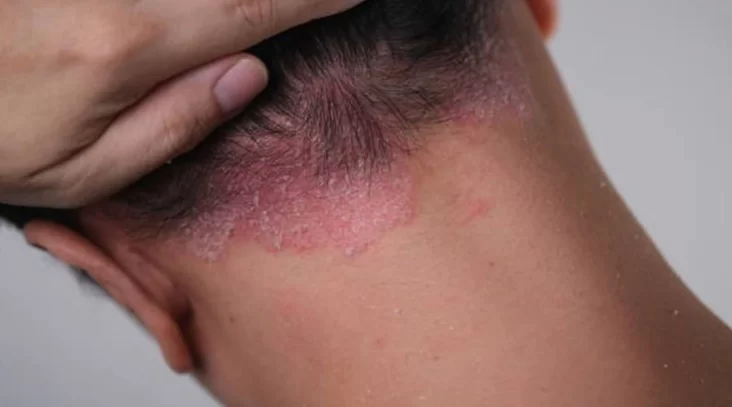Scalp psoriasis is a chronic autoimmune skin condition characterized by red, itchy, and scaly patches on the scalp. It occurs when the immune system mistakenly attacks healthy skin cells, causing an overproduction of skin cells that accumulate on the surface. While there is no cure for scalp psoriasis, various treatments can help manage symptoms and improve the quality of life for individuals affected by the condition.
Symptoms of Scalp Psoriasis
- Red, inflamed patches on the scalp.
- Silver-white scales or plaques covering the affected areas.
- Itching, burning, or soreness on the scalp.
- Dry, cracked skin that may bleed.
Causes and Triggers:
The exact cause of scalp psoriasis is not fully understood, but it is believed to involve a combination of genetic, immune, and environmental factors. Common triggers for scalp psoriasis flare-ups include stress, cold weather, certain medications, infections, and hormonal changes.
Diagnosis:
Scalp psoriasis is typically diagnosed based on a physical examination of the scalp and symptoms. In some cases, a biopsy may be performed to confirm the diagnosis or rule out other conditions with similar symptoms, such as seborrheic dermatitis or eczema.
Treatment Options for Scalp Psoriasis:
Topical Treatments:
- Corticosteroids: Topical corticosteroids are commonly prescribed to reduce inflammation and itching. They come in various strengths and formulations, including creams, ointments, gels, and foams.
- Calcineurin Inhibitors: Tacrolimus (Protopic) and pimecrolimus (Elidel) are topical immunomodulators that can help reduce inflammation and suppress the immune response in scalp psoriasis.
- Coal Tar: Coal tar preparations, such as shampoos, gels, and ointments, can help slow down the rapid growth of skin cells and reduce scaling and itching.
- Salicylic Acid: Shampoos and topical preparations containing salicylic acid can help soften and remove scales, making other treatments more effective.
- Topical Retinoids: Tazarotene (Tazorac) is a topical retinoid that can help normalize skin cell growth and reduce inflammation in scalp psoriasis.
Phototherapy:
- Phototherapy, or light therapy, involves exposing the scalp to ultraviolet (UV) light to slow down the growth of skin cells and reduce inflammation. It can be performed using natural sunlight, UVB lamps, or excimer lasers under the supervision of a dermatologist.
Oral Medications:
- In severe cases of scalp psoriasis that do not respond to topical treatments or phototherapy, oral medications such as methotrexate, cyclosporine, or acitretin may be prescribed to suppress the immune system and reduce inflammation.
Biologic Therapies:
- Biologic medications, such as adalimumab (Humira), etanercept (Enbrel), infliximab (Remicade), ustekinumab (Stelara), and secukinumab (Cosentyx), target specific components of the immune system involved in psoriasis inflammation. They are usually reserved for severe cases of scalp psoriasis that have not responded to other treatments.
Lifestyle and Home Remedies:
- Gentle Hair Care: Use a mild shampoo and avoid harsh chemicals or excessive scrubbing that can irritate the scalp.
- Moisturize: Apply moisturizers or emollients to the scalp to help hydrate the skin and reduce dryness.
- Avoid Triggers: Identify and avoid triggers that can worsen scalp psoriasis, such as stress, smoking, alcohol consumption, and certain medications.
- Stress Management: Practice stress-reduction techniques, such as meditation, yoga, deep breathing exercises, or therapy, to help manage stress and prevent flare-ups.
Scalp psoriasis can be a challenging condition to manage, but with proper treatment and self-care, most individuals can achieve significant symptom relief and maintain a good quality of life. It’s essential to work closely with a dermatologist to develop a personalized treatment plan tailored to your specific needs and preferences. You can book an appointment with our experienced Dermatologists at Sujata Birla Hospital, Nashik. Additionally, adopting a healthy lifestyle, managing stress, and avoiding triggers can help reduce the frequency and severity of scalp psoriasis flare-ups over time.

